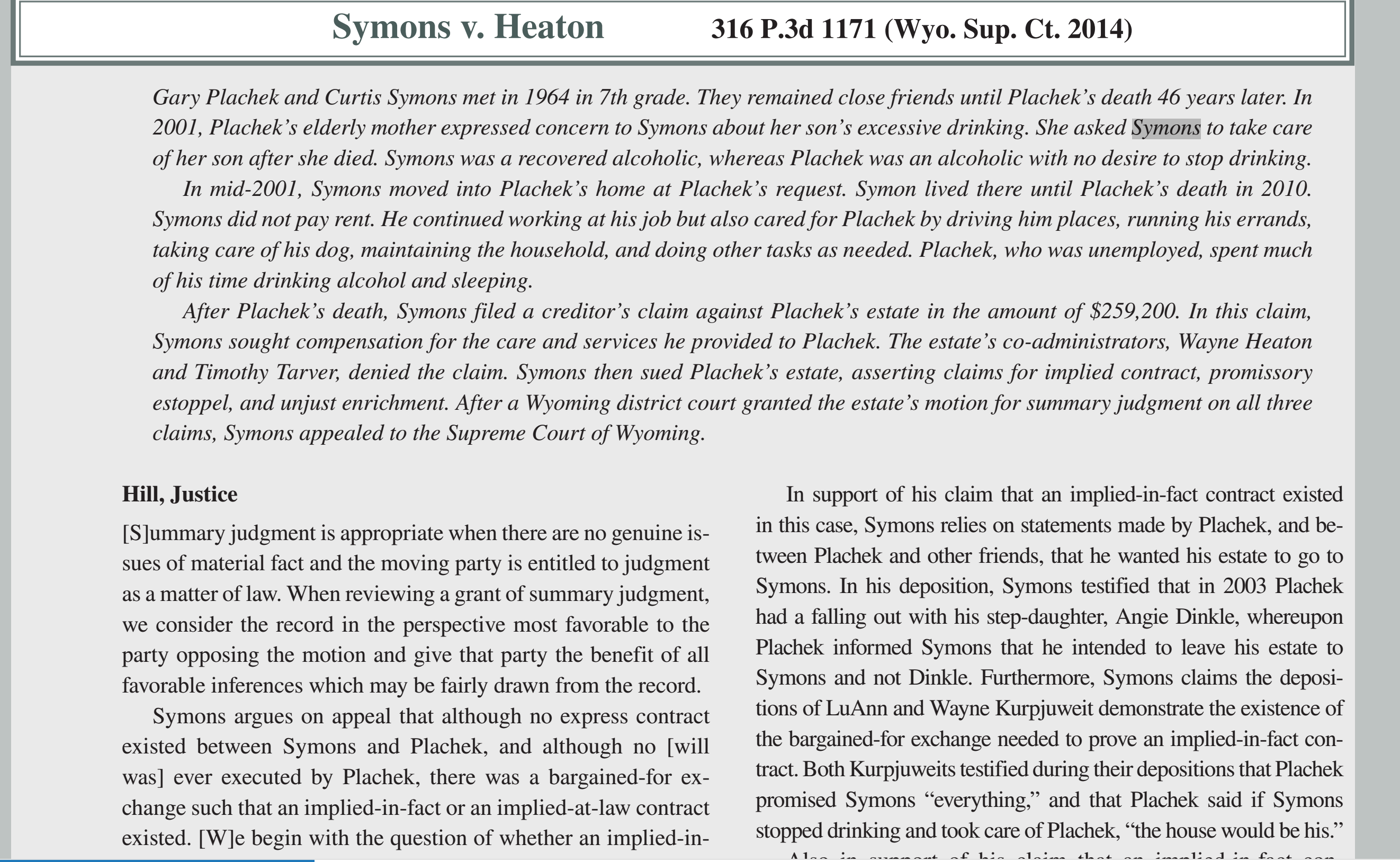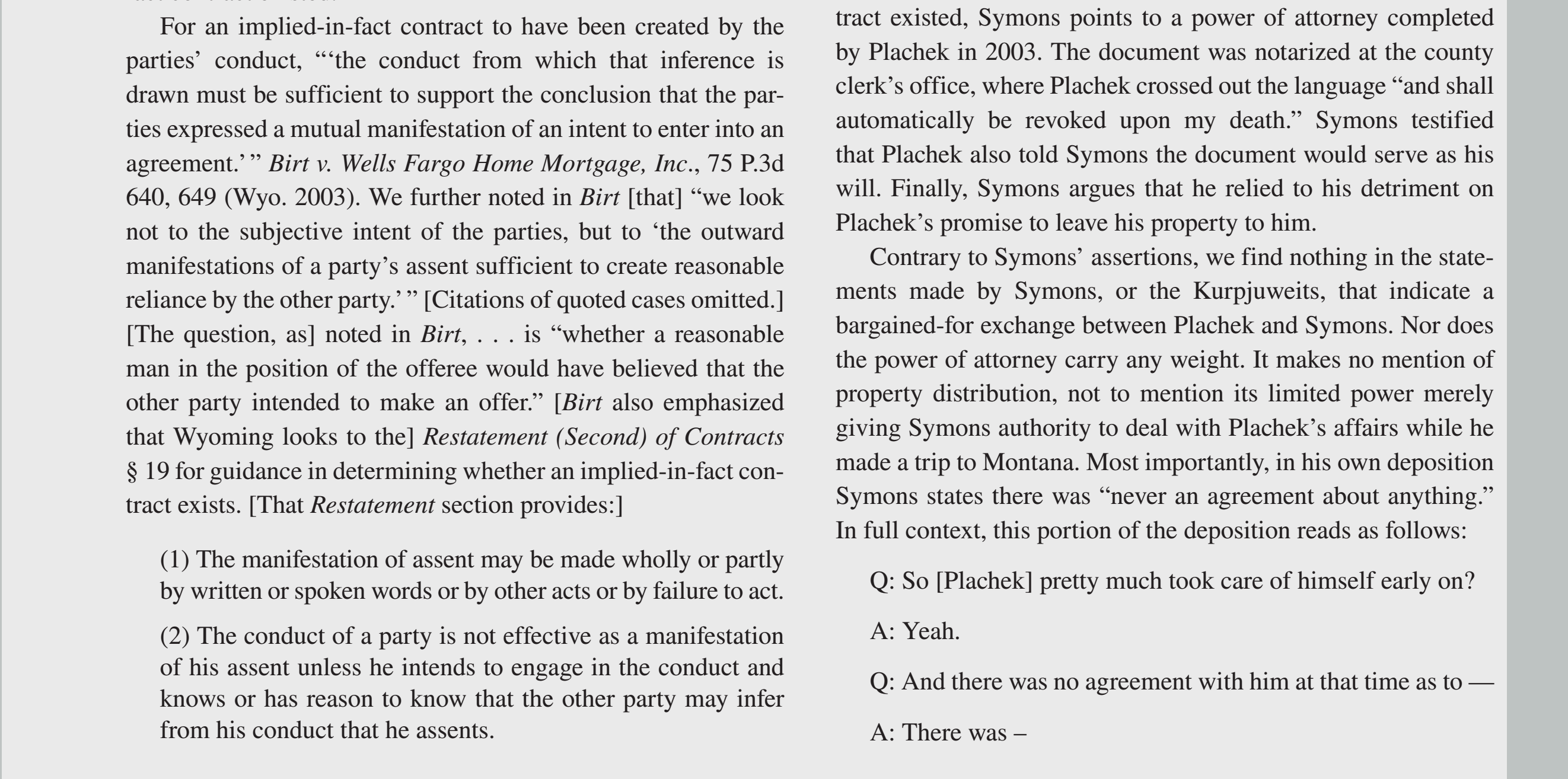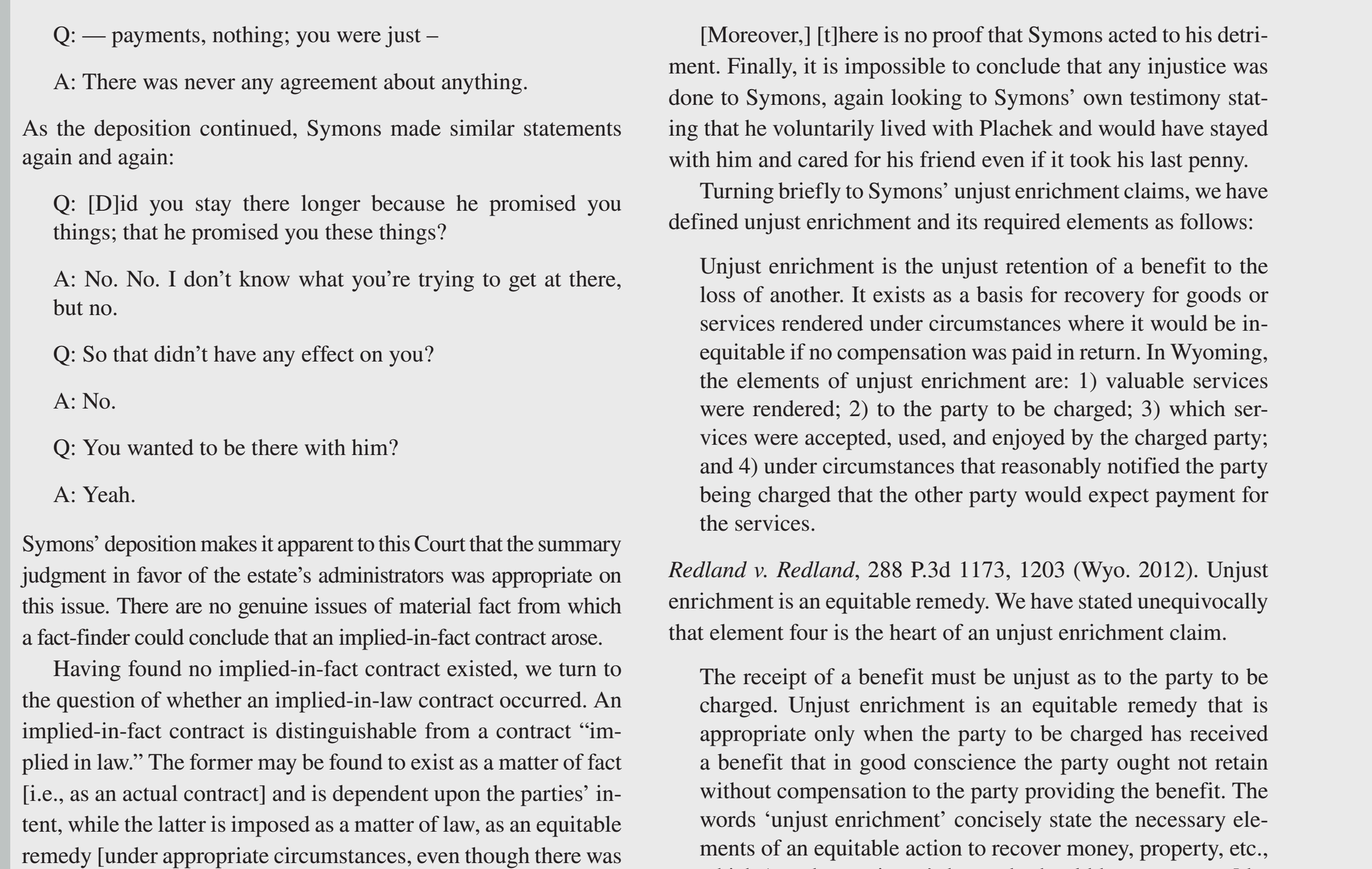



This is the case of Symons v Heatons
Question: please summarize and include
the following;
Fact:
Judgment:
Issue:
Holding:
General Analysis
Applied Analysis:
Symons v. Heaton 316 P.3d 1171 (Wyo. Sup. Ct. 2014) Gary Plachek and Curtis Symons met in 1964 in 7th grade. They remained close friends until Plachek's death 46 years later. In 2001, Plachek's elderly mother expressed concern to Symons about her son's excessive drinking. She asked Symons to take care of her son after she died. Symons was a recovered alcoholic, whereas Plachek was an alcoholic with no desire to stop drinking. In mid-2001, Symons moved into Plachek's home at Plachek's request. Symon lived there until Plachek's death in 2010. Symons did not pay rent. He continued working at his job but also cared for Plachek by driving him places, running his errands, taking care of his dog, maintaining the household, and doing other tasks as needed. Plachek, who was unemployed, spent much of his time drinking alcohol and sleeping. After Plachek's death, Symons filed a creditor's claim against Plachek's estate in the amount of $259,200. In this claim, Symons sought compensation for the care and services he provided to Plachek. The estate's co-administrators, Wayne Heaton and Timothy Tarver, denied the claim. Symons then sued Plachek's estate, asserting claims for implied contract, promissory estoppel, and unjust enrichment. After a Wyoming district court granted the estate's motion for summary judgment on all three claims, Symons appealed to the Supreme Court of Wyoming. Hill, Justice In support of his claim that an implied-in-fact contract existed [Slummary judgment is appropriate when there are no genuine is- in this case, Symons relies on statements made by Plachek, and be- sues of material fact and the moving party is entitled to judgment tween Plachek and other friends, that he wanted his estate to go to as a matter of law. When reviewing a grant of summary judgment, Symons. In his deposition, Symons testified that in 2003 Plachek we consider the record in the perspective most favorable to the had a falling out with his step-daughter, Angie Dinkle, whereupon party opposing the motion and give that party the benefit of all Plachek informed Symons that he intended to leave his estate to favorable inferences which may be fairly drawn from the record. Symons and not Dinkle. Furthermore, Symons claims the deposi- Symons argues on appeal that although no express contract tions of LuAnn and Wayne Kurpjuweit demonstrate the existence of existed between Symons and Plachek, and although no [will the bargained-for exchange needed to prove an implied-in-fact con- was] ever executed by Plachek, there was a bargained-for ex- tract. Both Kurpjuweits testified during their depositions that Plachek change such that an implied-in-fact or an implied-at-law contract promised Symons "everything," and that Plachek said if Symons existed. [Wje begin with the question of whether an implied-in- stopped drinking and took care of Plachek, "the house would be his."For an implied-in-fact contract to have been created by the parties' conduct, \"'the conduct from which that inference is drawn must be sufficient to support the conclusion that the par- ties expressed a mutual manifestation of an intent to enter into an agreement.' \" Birt v. Wells Fargo Home Mortgage, Inc., 75 P.3d 640, 649 (Wyo. 2003). We further noted in Birt [that] \"we look not to the subjective intent of the parties, but to 'the outward manifestations of a party's assent sufficient to create reasonable reliance by the other party.' \" [Citations of quoted cases omitted] [The question, as] noted in Birt, . . . is \"whether a reasonable man in the position of the offeree would have believed that the other party intended to make an offer.\" [Birt also emphasized that Wyoming looks to the] Restatement (Second) of Contracts 19 for guidance in determining whether an impliedinfact con- tract exists. [That Restatement section provides:] (1) The manifestation of assent may be made wholly or partly by written or spoken words or by other acts or by failure to act. (2) The conduct of a party is not effective as a manifestation of his assent unless he intends to engage in the conduct and knows or has reason to know that the other party may infer from his conduct that he assents. tract existed, Symons points to a power of attorney completed by Plachek in 2003. The document was notarized at the county clerk's office, where Plachek crossed out the language \"and shall automatically be revoked upon my death.\" Symons testified that Plachek also told Symons the document would serve as his will. Finally, Symons argues that he relied to his detriment on Plachek's promise to leave his property to him. Contrary to Symons' assertions, we find nothing in the state- ments made by Symons, or the Kurpjuweits, that indicate a bargainedfor exchange between Plachek and Symons. Nor does the power of attorney carry any weight. It makes no mention of property distribution, not to mention its limited power merely giving Symons authority to deal with Plachek's affairs while he made a trip to Montana. Most importantly, in his own deposition Symons states there was \"never an agreement about anything.\" In full context, this portion of the deposition reads as follows: Q: So [Plachek] pretty much took care of himself early on? A: Yeah. Q: And there was no agreement with him at that time as to A: There was Q: payments, nothing; you were just A: There was never any agreement about anything. As the deposition continued, Symons made similar statements again and again: Q: [D]id you stay there longer because he promised you things; that he promised you these things? A: No. No. I don't know what you're trying to get at there, but no. Q: So that didn't have any effect on you? A: No. Q: You wanted to be there with him? A: Yeah. Symons' deposition makes it apparent to this Court that the summary judgment in favor of the estate's administrators was appropriate on this issue. There are no genuine issues of material fact from which a fact-fmder could conclude that an implied-in-fact contract arose. Having found no impliedinfact contract existed, we turn to the question of whether an implied-in-law contract occurred. An implied-in-fact contract is distinguishable from a contract \"im- plied in law.\" The former may be found to exist as a matter of fact [i.e., as an actual contract] and is dependent upon the parties' in tent, while the latter is imposed as a matter of law, as an equitable remedy [under appropriate circumstances, even though there was [Moreover,] [t]here is no proof that Symons acted to his detri- ment. Finally, it is impossible to conclude that any injustice was done to Symons, again looking to Symons' own testimony stat- ing that he voluntarily lived with Plachek and would have stayed with him and cared for his friend even if it took his last penny. Turning briey to Symons' unjust enrichment claims, we have defined unjust enrichment and its required elements as follows: Unjust enrichment is the unjust retention of a benefit to the loss of another. It exists as a basis for recovery for goods or services rendered under circumstances where it would be in- equitable if no compensation was paid in return. In Wyoming, the elements of unjust enrichment are: 1) valuable services were rendered; 2) to the party to be charged; 3) which ser- vices were accepted, used, and enjoyed by the charged party; and 4) under circumstances that reasonably notified the party being charged that the other party would expect payment for the services. Redland v. Redland, 288 P.3d 1173, 1203 (Wyo. 2012). Unjust enrichment is an equitable remedy. We have stated unequivocally that element four is the heart of an unjust enrichment claim. The receipt of a benefit must be unjust as to the party to be charged. Unjust enrichment is an equitable remedy that is appropriate only when the party to be charged has received a benefit that in good conscience the party ought not retain without compensation to the party providing the benefit. The words 'unjust enrichment' concisely state the necessary ele- ments of an equitable action to recover money, property, etc., no actual contract]. Symons argues that through the doctrines of which 'good conscience' demands should be set over to [ the promissory estoppel and unjust enrichment, an implied-in-law plaintiff by the defendant]. contract must have existed here. We disagree. Redland, 288 P.3d at 1205-06. The elements of promissory estoppel are as follows: (1) the ex- Here, one friend took care of another for years. Symons never istence of a clear and definite promise which the promisor should expected payment and testified to that during his deposition. Sy- reasonably expect to induce action by the promisee; (2) proof that mons took care of Plachek because he was his friend. He stated the promisee acted to its detriment in reasonable reliance on the that he moved in because "he wanted to," because he "wanted to promise; and (3) a finding that injustice can be avoided only if the be there for [Plachek]," and because of "a commitment I made to court enforces the promise. Symons comes up short on the first [Plachek's mother] and [Plachek] both." requirement-the existence of a clear and definite promise. The [The district court correctly concluded that] no question of power of attorney provides no such proof and Symons' own depo- material fact existed and that Symons failed as a matter of law on sition testimony positively refutes any clear and definite promise. his claims for implied-in-fact contract, promissory estoppel and In fact, the record raises no genuine issue of material fact with unjust enrichment. regard to any of the elements of promissory estoppel. There was no clear and definite promise from Plachek to Symons. Summary judgment in favor of Plachek's estate affirmed














